- Home
- Jess Walter
Ruby Ridge: The Truth and Tragedy of the Randy Weaver Family Page 8
Ruby Ridge: The Truth and Tragedy of the Randy Weaver Family Read online
Page 8
Other justifications of racism came from biblical apocrypha, the so-called lost books of the Bible. The number of books accepted as canon varies from church to church, but the Weavers began believing in Christian Identity, a racist religion that accepts obscure, ancient writings that few churches recognize as legitimate, like the book of Enoch, in which dark angels descended to earth, took human wives and “the women became pregnant and gave birth to great giants whose heights were three hundred cubits [about fifty feet]. These giants … turned against the people in order to eat them. And they began to sin against birds, wild beasts, reptiles and fish …” Many Identity Christians say that was the beginning of the African race, which they called “mud people.”
Quickly, the Weavers fanned through the views of the radical people they met, accepted the ones that fit their ever-changing philosophy, discarded the ones that didn’t, and worked to become the most studied, serious, and spiritual racists in all of Idaho.
VICKI WAS GETTING WORKED UP again by current affairs and the conversations she was having with other people in northern Idaho, many of whom were further along in the track of radical right-wing belief. The election was coming up, and Vicki wrote her friends in Iowa for more information about “this Gary Hart person,” who she believed might have been foretold by one of the prophets. She found herself drawn to Daniel, Chapter 5, wherein the original Babylon is destroyed. The Hebrew phrase “Mene, Mene, Tekel” appears in Daniel, and it began popping into Vicki’s mind “when I least expect it. I think Jesus is telling me the U.S.A. is going to fall soon.”
The first sign, the Weavers and their friends agreed, would be the devaluing and changing of money right after the November 1984 election.
“I prayed in Iowa that He would let me know so I could finish getting supplies before our money was useless,” Vicki wrote. “We’ve heard they’ll give you a new dollar for every ten of the old. It’ll hit people with savings and the retired the hardest. The factory workers with debts will be fine. They’ll just make their new phony money every week.”
Toward the end of every summer, Vicki’s parents drove 1,500 miles west to visit the Weavers in the mountains. That first trip, David turned off the highway, crossed Ruby Creek and started along the dirt road, up the mountainside, until they reached a clearing, and he figured, this must be it. But according to the directions Vicki had sent, they were still a mile away. That last mile was nearly impassable, an old logging road that David thought couldn’t get any worse until it would jog around a tight switchback and be even more rutted, even more overgrown. Finally, they carne to the rocky point where Vicki and Randy had settled, and one thought crept into David’s mind.
“Why in the world,” he asked, “would anyone build a cabin up here?” The view was incredible, but it was no place to live. Why not build the cabin down below and walk up here to look at the view, he asked Randy. The house was built on logs leaning out over the bank, and the logs weren’t even tied down. With all the nice, accessible land below, his daughter and son-in-law had chosen an awful, rocky point and built a house that looked like it was going to slide right down the cliff.
They unloaded the supplies and books they’d brought and helped work on the house. David even tied down the logs on which the house was built. While they still disapproved of Randy and Vicki’s lifestyle and their ever-hardening beliefs, they reached a sort of truce and enjoyed their visits, watching the kids chase each other through the woods and fish for palm-size trout in the mountain streams. Sara and Sammy would wait hungrily for their grandparents and then run off with whatever books they’d brought, often finishing them before David and Jeane had even left the mountain. On those warm summer nights, Vicki and her mom stayed up until 2:00 a.m., canning and sewing and just talking about things. Vicki was clearly the one who kept things going up there, Jeane thought. On those summer trips, she began seeing those same qualities in Sara, who was growing up like a piece cut from her mother.
Randy got jobs on a road crew, splitting wood and running errands. His longest stint was at Paradise Dairy in Bonners Ferry, where he spent a year driving farm equipment and doing chores. He was a good worker and didn’t talk much about his beliefs, but there was so much to do on his own cabin, he barely had time for a job.
IN 1984, RANDY BROUGHT home another stray. Kevin Harris’s father had died when he was two years old. His mother was only twenty-two and expecting her fourth baby, and it was difficult for her to raise children when she was growing up herself. Kevin had trouble in school in Spokane, was placed in foster homes, and began running away from home at nine. He lived with some mutual friends in Idaho for a while, and that’s where he met Randy and Vicki—when he was fifteen. Kevin told them he needed help getting off the streets and away from drugs. They said he could stay with the family whenever he wanted. On Ruby Ridge, he found a family as warm and structured as he’d always wanted, along with horses, dogs, chickens, and guns. As Randy began to share the family’s beliefs with him, they made sense to Kevin and explained the world in a way he’d never thought of before. Even though he’d known black and Jewish kids in Spokane, Kevin began to agree with the Weavers that the races ought to be separate. He was as quiet and loyal as a German shepherd, an impressionable young guy looking for a father figure like Randy and for someone who saw him as a big brother, as Sara, Sammy, and Rachel did.
His mother, Barb, a manicurist in Spokane, and his stepfather, Brian, a paralegal for the county prosecutor’s office, were glad Kevin was staying somewhere and was off the streets, but they couldn’t believe he’d fallen for that ridiculous religion. The Pierces visited the cabin once and were impressed by how close the family was and glad to see Kevin gardening and baking. But they were sickened by Randy’s beliefs, as he explained that black people were created as a slave race and that Jews controlled all the money in the world. Brian had to keep from laughing when Randy told him the Jewish hook nose was “the mark of Cain.”
Over the next nine years, Kevin Harris would drift around the western states, working as a logger and a laborer. He’d come and go from Ruby Ridge, often walking eighty miles from Spokane on blistering feet. He’d be gone for a couple months and then he’d show up again, always seeming to know when the family was feeling persecuted and needed his strong, quiet friendship.
BACK IN CEDAR FALLS, IOWA, Carolee Flynn read the letters from Vicki and worried the family wasn’t getting enough to eat. Across town, Vaughn Trueman read his own letters from the Weavers explaining how they’d come to believe that only white Christians were chosen and how Jews were the spawn of Satan. He still thought the Weavers were the kindest, hardest-working people he knew, but he wished they would find the peace of mind that he’d found in the love of Jesus. Mike Roethler got a phone call from Randy, and even though his own spirituality seemed static since the end of the Bible study sessions, he felt bad that his old friends had become mired in hatred and fear. He wondered how he could have been on the same track at one time.
In Fort Dodge, David and Jeane reported to the others that Randy and Vicki really were living on a mountaintop. But it seemed they were doing okay and sometimes the apocalyptic talk subsided, although it was being replaced by more fervent racism and survivalism. Jeane hoped they would just settle down and eventually move down the mountain and into town. David hoped they didn’t freeze to death once winter came.
Julie and Keith tried to comprehend that the Weavers’ racial beliefs had gotten even more radical, but they couldn’t. They cringed at the descriptions of Sara and Sammy learning to shoot guns. Julie just couldn’t believe that Vicki would let her babies fire guns! They had seen Randy and Vicki obsessed and overwrought about everything that caught their attention, but it was hard to imagine that they’d become the thing that liberals like Julie and Keith simply had no use for: outright racists.
Julie remembered how Vicki had come out of the bad times, and she just hoped that—once she and her husband realized the government wasn’t coming after them—she would
come to her senses, drive down the mountain, and come home to Iowa. Maybe, she hoped, the peace of country living would bring her sister back from the edge.
CITY PEOPLE LIKE TO BELIEVE that once you get out to a place like Boundary County, where you might be a half-mile from your nearest neighbor, everyone gets along in a sort of Mayberry bliss. Most rural sheriffs will tell you that’s not the case. There are always disagreements, land disputes, misunderstandings, and grudges. Oftentimes, the sheriff can’t even figure out who started it or what the fight is about.
Almost from the time they arrived, the Weavers were at the center of those kinds of feuds. Seemed every six months or so, the sheriff was called up to Ruby Ridge to talk to the Weavers or one of their neighbors. Someone was shooting guns at night. Someone else ran pipe over that person’s land. Those people dumped garbage on the road. That guy cut firewood off this guy’s property. This guy shot that guy’s goat.
Sam Wohali was a judge for the Kootenai Indian tribe who moved his wife and seven children onto land near the Weaver cabin in the summer of 1984. A big guy with waist-length braids, he was always being told he didn’t look Indian. That summer, Randy helped Sam build a fence around his place, but their friendship lasted only a couple of weeks. Wohali—who said he was half Indian, half German Jew—didn’t appreciate hearing about Randy’s racist beliefs, and he got tired of all the gunfire coming from the Weaver cabin. Once, when a border patrol agent was visiting Wohali, the judge heard automatic weapon fire come from a stand of trees where Weaver and another man had just driven.
By August, Sam Wohali had had enough gunfire and racist talk. He saw Randy standing in the Naples general store with a bunch of Randy’s friends, who also wore fatigues and sidearms.
“Can I talk to you in private?”
Randy said no.
Wohali told him to stop shooting at his house.
“What’ll you do if I don’t?” Randy asked.
“I’ll kick your ass,” Wohali said. He was furious. “Am I correct in understanding that you believe the end of the world will come sometime in the next two months, that this will start to take place—something between the blacks and the Hell’s Angels—and that it will end up at your house, on your front door, and that it will be the start of the end of the world?”
“More or less,” Randy said.
“And you will have to take your groceries by violence and shoot your neighbors?”
“More or less.”
“Randy, whatever God you serve, when you come down that mountain, and He tells you it’s time to shoot your neighbors, turn left at my driveway, don’t turn right. Because if you come to my house … I’ll tie you up by your big toes, I’ll cut off your fingertips, and I’ll drip you dry, you sucker. I’ll torture your ass. Don’t screw with my family. That goes for you and all of you G.I. Joe haters. I’m tired of it. You’re not going to intimidate me.”
Later, Sam Wohali and Weaver made up. But Terry Kinnison never got over his problems with the Weavers. He said Randy sold him half interest in the Weavers’ twenty acres for $3,000, just so Terry would have a place to move a trailer and build a barn. And then, Kinnison said, Randy kicked him off the land. Randy said it didn’t happen that way at all. Whatever happened, Kinnison and his family moved up to the mountaintop and then quickly got into a fight with the Weavers.
Finally, an argument over some firewood nearly started a fight between the two men when Randy came into the barn and told Kinnison he was a liar and a cheat. Terry held up the hammer in his hand but decided against it. “You’re not even worth it.”
After that, Kinnison moved off the mountain, filed a lien for the $3,000 he said he’d invested, drove into Bonners Ferry, and told the sheriff that Randy was nuts and was possibly even going to kill the president.
KINNISON WROTE LETTERS and spoke to the FBI, the Secret Service, and the local sheriff, claiming Randy had threatened President Ronald Reagan and Idaho Governor John Evans. He said Weaver had a cache of guns and ammunition, including automatic weapons, and had rigged his driveway with bombs. Wohali talked to the agents, too, and said he’d heard many of the same things, that Randy’s wife was “a crack shot” and that anyone who went up there would face three armed people: Randy, Vicki, and six-year-old Sammy. The federal agents interviewed several other friends and neighbors but had to wait to interview the Weavers because a late winter storm snowed the family in. Finally, though, the Weavers drove down the hill to talk to federal agents.
So this was how the end would come, Randy and Vicki realized, through betrayal by their former friends, who brought an invasion of federal agents—toting guns and extending the rule of the Jewish-controlled government. They had chased Randy out of the John Deere factory, bugged the family’s phones, and now were accusing Randy of threatening to kill the president, just so the family would be killed or scattered and Terry Kinnison could get their land. There really was nowhere to hide.
As they always did when trouble began, Randy and Vicki—ever the good executive secretary—sat down to write a letter, official and precise even in her feminine, cursive handwriting.
Thursday, February 28, 1985
To Whom It May Concern:
We are the victims of a smear campaign of our character and false accusations made against us to the Federal Bureau of Investigation and the United States Secret Service by some local residents who have a motive for my decease. These local residents are named:
They listed the Kinnisons and three others.
She wrote the names of the FBI agents and other officials they’d gone to for help and noted that they might have to defend themselves from attack. She wrote that there were witnesses to a conspiracy against them and said the Secret Service was building a fraudulent case against Randy because they didn’t like his beliefs. Years later, when a reporter uncovered the old affidavit, it seemed to be an eerie prediction.
My accuser set me up as a criminal member of the Aryan Nations. They accused me of having illegal weapons. They accused me of saying I was going to assassinate the President of the United States and the Pope. Very possibly, a threatening letter was sent to the President with my name or initials forged. My accusers hoped the FBI would rush my home with armed agents hoping I would feel the need to defend myself and thus be killed or arrested for “assault on a federal officer.” Fortunately, bad weather (the first part of Feb. 1985), witnesses to this plot and our God, the Lord Jesus Messiah, King of Israel prevented a disaster.
Two months later, they wrote the Secret Service agent who had interviewed them, demanding an apology and a copy of a “forged letter” that didn’t exist. Then, they wrote a quick note to Ronald Reagan, apologizing and explaining what had happened.
Apparently, some local residents, who wished me ill fortune, carelessly used you and sent you a threatening letter (which I’m confident you never saw) and forged my signature on it hoping I’d be sent to prison so they could harass my wife and squat on my land.
Please let me apologize for their evil in using you to get at me. I’m sorry such a letter was ever sent …
Then, the Weavers asked for his help. If someone on his staff could mail the letter to the Boundary County prosecutor, perhaps they could prove who forged the letter. Apparently, President Reagan didn’t write back.
The rumors doubled the Weavers’ fear and paranoia. As always, contention drew the couple closer together and convinced them that the end was at hand. In fact, it was right on time, according to Vicki’s predictions.
Suddenly, everyone around them seemed to be traitors and conspirators. The Weavers responded the way they always did when they felt pushed—going a little further out on the fringe. Soon, Randy decided to check out the group he’d heard about from his survivalist buddy, Frank Kumnick. In the summer of 1986, Randy and Frank drove down the road a stretch to the annual Aryan Nations World Congress.
FIVE
ABOUT THE SAME TIME Randy and Vicki Weaver were finishing their cabin, the Coeur d’Alene office o
f the Federal Bureau of Investigation was launching a full-scale probe of the Aryan Nations, every agent in the office engrossed in a far-ranging investigation of the racist organization. Of course, at the time—the early months of 1984—the Coeur d’Alene office of the FBI was just one guy, a resourceful eighteen-year veteran agent named Wayne Manis, who had just escaped to Idaho himself, requesting a transfer after a long drug investigation in the Birmingham, Alabama, office.
A holdover from J. Edgar Hoover’s bureau, Manis looked more like a country-western lounge singer than a G-man. He was a retired Marine with wavy brown hair, halfway to graying. But it was his wardrobe that was so incongruous: flashy western clothes and long coats, gold jewelry and dinner-plate belt buckles. His methods were decidedly nonbureau as well; he preferred common sense to wiretaps, and although he could skulk and spy with the best of them, he knew the best way to find out if someone was breaking the law was to ask them.
It didn’t take Manis long to see where his attention was needed. Ten miles north of Coeur d’Alene stood the twenty-acre, wooded compound of the Church of Jesus Christ Christian and its political arm, the Aryan Nations. The church had been founded by Richard Girnt Butler, a leathery-faced former Lockheed Corporation engineer and a disciple of Dr. Wesley Swift, who was an early leader in the Christian Identity movement. Immediately, Manis called for a meeting with Butler, sat down across from him, and just asked what was going on.
In the 1960s, while the Ku Klux Klan was getting all the attention, the real growth in the racist right movement was being made on the religious end, specifically, the hybrid religion called Christian Identity. It was basically the same doctrine Randy and Vicki Weaver had arrived at, an unlikely blend of strict evangelical and Mormon theology, American nationalism, and a defunct movement called British Israelism, which taught that white Europeans were the lost tribes of Israel. If that were true, the Jews had to be something else: impostors—in fact, the very seed of Satan, sown through one of Eve’s sons when she was seduced by the serpent, or perhaps through one of Noah’s children.

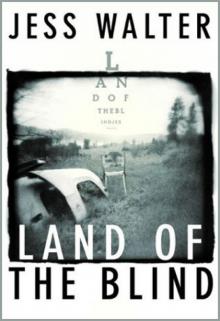 Land of the Blind
Land of the Blind Don't Eat Cat
Don't Eat Cat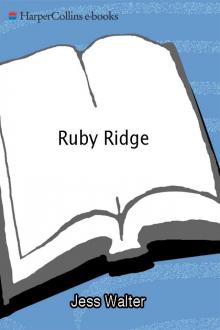 Ruby Ridge: The Truth and Tragedy of the Randy Weaver Family
Ruby Ridge: The Truth and Tragedy of the Randy Weaver Family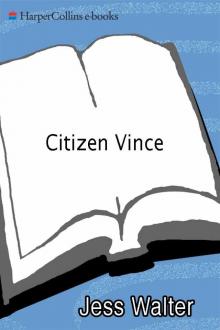 Citizen Vince
Citizen Vince Beautiful Ruins
Beautiful Ruins We Live in Water
We Live in Water The Zero: A Novel
The Zero: A Novel The Zero
The Zero The Cold Millions
The Cold Millions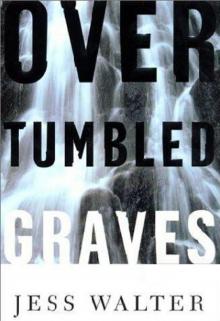 Over Tumbled Graves
Over Tumbled Graves We Live in Water: Stories
We Live in Water: Stories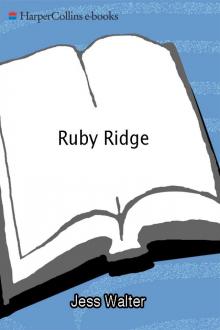 Ruby Ridge
Ruby Ridge (2006) The Zero
(2006) The Zero (2004) Citizen Vince
(2004) Citizen Vince